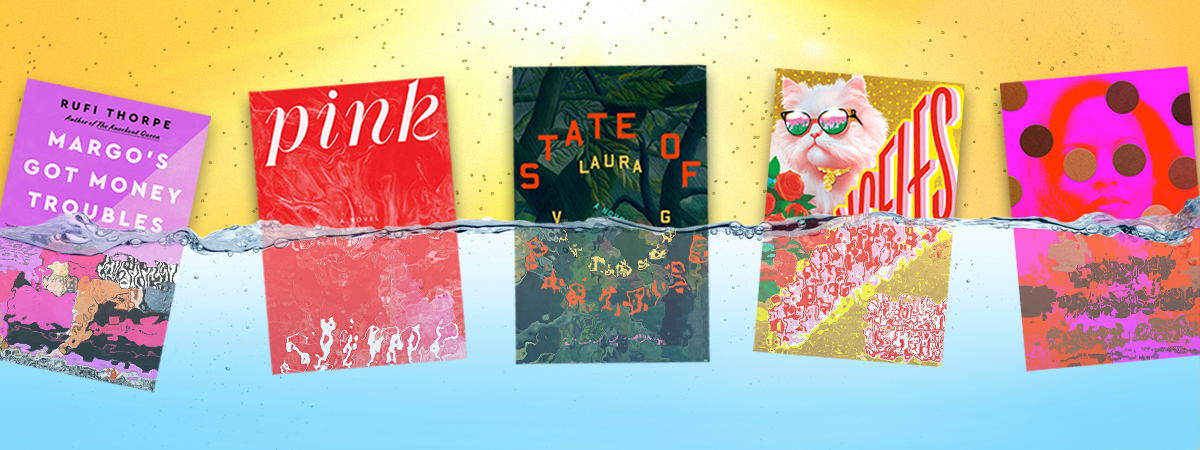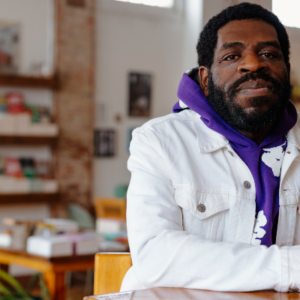One of the greatest pleasures in life is reading outdoors, something that becomes eminently more possible—at least for those of us living in the American Northeast—after Memorial Day. Well, here we are—but now that you’ve scoped out your cozy spot underneath a tree, what to read first? The Lit Hub staff is, as ever, here to help, with a few of our favorite new novels being published this season. So go forth and touch grass, but as always, take a book.
*
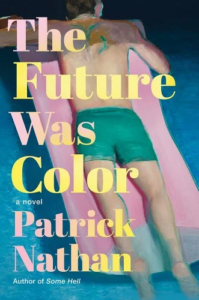
Patrick Nathan, The Future Was Color
Counterpoint, June 4
Patrick Nathan’s The Future Was Color is secretly two projects in one. The novel begins as a very pleasurable period piece–we follow George, a queer screenwriter of sci-fi B movies, as he falls in and out of love and tries to stay off the Blacklist in a lushly rendered 50s Hollywood. And this central plot, with its noir and thriller flourishes, is propulsive enough–but then we start to slip genre’s bounds. We move back and forth in George’s memories until the novel expands like lungs, becoming this poignant meditation on the conundrum of art-making in apocalyptic times. Nathan also captures (multiple) earth-shaking romances without glossing their edges or wallowing in their endings, which struck me as masterful. Especially since the book never feels weighty or smug. It’s rather, as others have noted, very sexy and insistently alive. This one’s an ode to the people and projects that light us up, in spite of all the darkness.
The creeps-up-on-you-scope of this project put me in mind of Sarah Thankam Mathews’ All This Could Be Different. But the whimsical, sometimes mannered voice conjures Adam Haslett at times. Take this one to the beach house and snort it up with the sunset. You won’t regret it! –Brittany Allen
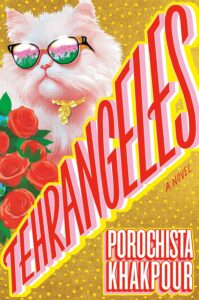
Porochista Khakpour, Tehrangeles
Pantheon, June 11
If I were to manifest my ideal summer novel, I would probably conjure something like funny, gossipy-meets-literary family saga. Enter: Tehrangeles, a wry, juicy satire that satisfied my urge for good sentences and great drama. Loosely, it’s Little Women meets Shahs of Sunset, with a cast of pitch-perfect characters who I found exasperating, heart-rending, and endlessly compelling. The wealthy (but not, by their estimation, wealthy enough) Iranian American Milani family are on the precipice of reality TV stardom… except it’s late 2019 (the plot-hingiest year in recent history). If you love talking to your smartest friends about the Bravoverse, this is the summer novel for you. –Jessie Gaynor
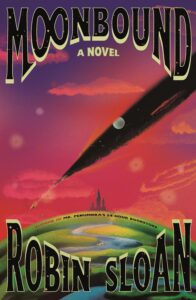
Robin Sloan, Moonbound
FSG/MCD, June 11
Summer, for me, demands adventure—and Robin’s Sloan’s new one is a riff on the classic SFF adventure novels of my childhood, right down to the 70s-pulp cover. It blends elements of science fiction and fantasy (really leaning into Arthur C Clarke’s classic axiom that “sufficiently advanced technology is indistinguishable from magic”) to create a joyful shout of a book about sentience, humanity, and… well, magic.
It’s set about 11000 years in the future on an Earth somehow crossed between post-human and pre-industrial Arthurian civilization (it’s shaping up to be a summer of Arthur; more on that below) with sentient yeast strains, beaver societies, wizards powerful enough to stop a heart with a single word, AI dragons who’ve destroyed most of civilization and built a palace on the moon, and so much more. It’s an epic novel, deeply curious about the possibilities of our future and the ethics of how we might get there, but it never loses sight of the fact that reading ought to be fun. Put this one alongside His Dark Materials and Ursula K. Le Guin’s Earthsea books. –Drew Broussard
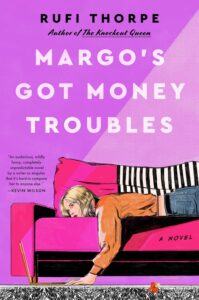
Rufi Thorpe, Margo’s Got Money Troubles
William Morrow, June 11
Here are a few things that are, possibly, equally deranged, depending on how you look at them, and/or how deep you let yourself get: OnlyFans, early motherhood, professional wrestling, sleeping with your unattractive professor, the concept and need for money, telling stories, falling in love, realizing that your parents are, alas, people themselves, the first person, heroin, everyone’s ideas about sex. Perhaps you will not be shocked, given where we are, to learn that these are all things that the eponymous Margo must navigate in Rufi Thorpe’s latest novel, which is in turns funny and moving, daring and satisfying, but above else, relentlessly charming—that rare book about storytelling that also tells a good story. –Emily Temple
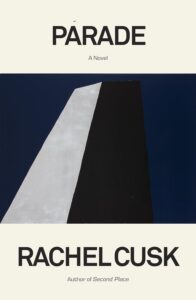
Rachel Cusk, Parade
FSG, June 18
There’s a strange thrill reading Parade, the newest novel from Rachel Cusk, which feels so much like the next stage in a complex journey the author has been undertaking for decades now. The lines to her most recent work—The Second Place (2021) and before that, the novels that make up The Outline Trilogy, Outline (2014), Transit (2016), and Kudos (2018)—are so clear, so distinct, and yet Parade proves itself an utter surprise. In the past, Cusk has often handed her narratives over to other storytellers, characters her narrator encounters who seize the story for some period, before finally ceding it back.
In Parade, we get a very different technique that seems to conjure up the same uncanny, transporting sensation—we are told the story of G, an artist. Only G, the artist is, we come to understand, many different people, leading different lives, encountering different experiences and sensations. But who is still G, maybe. As in The Second Place, there’s a penetrating interrogation of what it means to experience the world through, with, and alongside artists, and a question as to what all that longing and observation amounts to. Cusk herself is a kind of magician, directing our attention this way and that, while slowly something else entirely emerges, and we’re left shaking our heads, wondering how it was done, how this sense of wonder was elicited so beautifully. –Dwyer Murphy
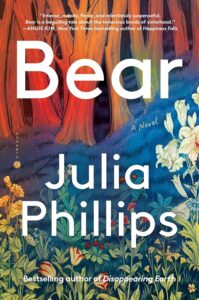
Julia Phillips, Bear
Hogarth, June 25
I read Disappearing Earth, when it came out in 2019 (which was, of course, last year), and I’ve been anxiously awaiting her follow-up ever since. Bear not only lives up to the high standard set by Phillips’ debut, it reveals new dimensions to the author’s considerable skill. The novel deftly weaves the mythic with the real to tell a story of two sisters living in economic precarity and caring for their dying mother on San Juan Island. When a grizzly bear haunts their property, Sam and Elena are divided as to whether the bear’s presence is reason for terror or hope. Phillips is a master of creating an atmosphere of beauty and suspense—I was torn between needing to race to the end and wanting to savor every word. –JG
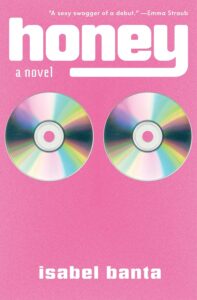
Isabel Banta, Honey
Celadon, June 25
I’m entering that unfortunate time in life when everything that was cool when I was a teenager—crop tops and baggy pants! Pop-punk! Flip phones!—is coming back into vogue and I’m forced to realize just what it means to be in my mid-30s… but I’m heartened to see that it isn’t just the trends but actually some thoughtful interrogation with how awful our society was in the late 90s and early 00s to just about everybody who wasn’t a straight white man.
Enter Isabel Banta’s Honey, just in time to continue the conversation about how terribly we all treated the teen pop sensations of the Y2K era. Amber Young, Gwen Morris, and Wes Kingston aren’t exactly Christina, Britney, and Justin… but Banta remixes those three (and so many more) into this snappy story of overnight stardom and being famous at the dawn of the internet age. It’s a delightfully bubblegum novel of hot summer nostalgia that also lands some serious blows to the patriarchal mores of a cultural milieu we still haven’t fully shaken off. –DB
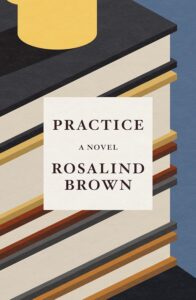
Rosalind Brown, Practice
FSG, June 25
Yes, this is a whole novel about a young woman trying to write an essay about Shakespeare’s sonnets. (This may be enough for you to read it, it was for me, and I was not disappointed.) But really it is a novel about the possibilities, and the limits, of attention, or even the life of the mind itself, as Annabel, our scholar, sits and tries to work, but is constantly diverted by her body’s irrepressible needs, the lure of the weather (mist, not sun), the intrusion of other humans, and—most thrillingly, in this novel full of thrills—even the denizens of her long-nurtured fantasy life. It is a book you can read in a day, and also the most convincing and compelling portrait of a single consciousness that I have come across in recent memory. –ET
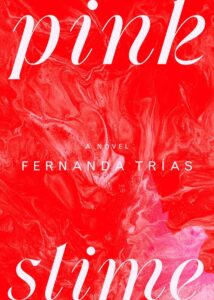
Fernanda Trias, tr. Heather Cleary, Pink Slime
Scribner, July 2
I have been waiting for this book since last summer’s Times write-up of the new wave of speculative fiction coming out of Latin America, and it doesn’t disappoint. This novel is being comped to the works of Samanta Schweblin and Mariana Enriquez—and while those are useful comparisons, particularly in the case of Schweblin’s Fever Dream—Pink Slime is very much its own beast, due to become a frequent comp title in its own right.
It’s set in a moment of ecological anxiety where a red algae bloom has created a ‘red wind’ off the sea that infects and kills most of the people exposed to it, where healthy/natural food is increasingly hard to come by and people eat processed meat paste instead. The narrator is struggling to adapt to this new world, trying her best to serve as a nanny for a constantly hungry boy and to take care of her stubborn mother and her dying ex-husband. Trías’s prose, in Heather Cleary’s terrific translation, pulls you in slowly until you find you can’t put the book down—like being locked in during a wind alarm, trying your best to keep your footing. I’ve already ordered Trías’s earlier novel The Rooftop from her UK publisher, because I’m that excited to read more. –DB
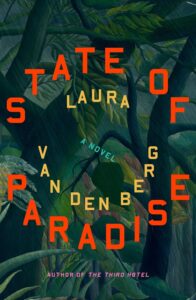
Laura van den Berg, State of Paradise
FSG, July 9
As I’m sure I’ve mentioned on this website before, I will go wherever Laura van den Berg and her eerie, uncanny imagination lead, even to the much-maligned sunshine state in storm season. State of Paradise, van den Berg’s third novel, is the story of a creatively unfulfilled ghost writer who returns—with her running-obsessed husband in tow—to the town where she grew up (and where she was briefly institutionalized a couple of decades previous).
There, in a post-pandemic central Florida, as the summer heat rises and her literary taskmasters’ demands become more opaque, very odd things begin to happen. Storms rage, people vanish, irises change color, snails gather en masse, and a virtual world called Mind’s Eye begins to supplant the real. But then, how can the narrator or her unravelling sister be certain that their reality is, well, real? And what knowledge is the famous thriller novelist who signs our protagonist’s paychecks hiding in his Floridian manse? A wry, surreal, lushly atmospheric metafictional mystery, I fell under the swampy spell of this novel from the get-go. –Dan Sheehan
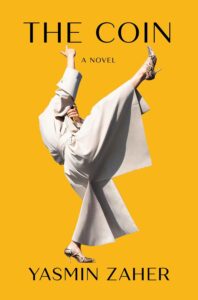
Yasmin Zaher, The Coin
Catapult, July 9
Yasmin Zaher’s The Coin is a novel of big ideas hiding in chic little packages—packages not unlike the Birkin bags that feature so heavily in the plot. In slick, clever chapters, we follow an unnamed Millennial woman around (initially) New York City. But if you feel you’ve heard this one before, you’d be wrong.
Our hero’s POV proves conspicuously strange, and her adventures surreal. A wealthy Palestinian—new in town, but recently orphaned—our narrator’s primed to observe the contradictions attending daily life in America. But as she fails to square those contradictions (poverty next to wealth, dirt next to beauty), she begins to disintegrate. Her vanity morphs into a cleanliness obsession. Her do-gooding instincts, sprouted in the soil of the “underprivileged boys” school where she teaches, go South. And the tragedy she’s been running from—which is, I think, a synecdoche for a global one—becomes impossible to avoid.
This is a sneakily profound book about material excess, the cost of ease, and all the broken promises an empire is built on. Yet it’s fun, even merry! The frosted-but-confident voice reminded me of Isa Epley, from Marlowe Granados’ Happy Hour. (“I’ve always been motivated by pleasure, never by money,” our narrator confides on the first page.) And Zaher’s relentless eye for modern details made me think of Halle Butler’s The New Me. –BA
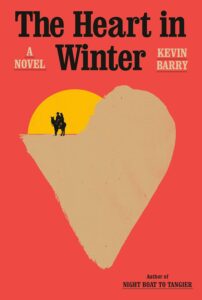
Kevin Barry, The Heart in Winter
Doubleday, July 9
All the blurb that should be required for you to saddle up your horse and ride hard toward your nearest bookstore on July 9 is this: Kevin Barry does Deadwood. Barry’s signature linguistic brio is on full, glorious display in this rollicking tale of a young(ish) Irish immigrant—a melancholic, opium-smoking balladeer and occasional Cyrano-for-hire named Tom Rourke—in a Montana mining town in 1891 who begins a passionate affair with Polly Gillespie, the fiery new bride of dull-as-ditchwater captain Long Anthony Harrington. The lovestruck duo rob a safe, steal a horse, and light out for the territory, with Harrington’s psychotic man Jago in hot pursuit. Barry never disappoints, but this one is a pure pleasure. A thrilling, tumescent, poetically vulgar, big-hearted romp of a novel, where the fearless blending of vernaculars makes for a wholly unique and utterly electrifying reading experience. –DS
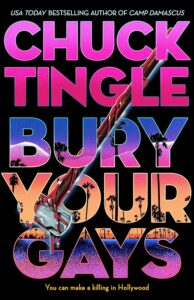
Chuck Tingle, Bury Your Gays
Tor Nightfire, July 9
I loved Chuck Tingle’s traditional-publishing debut Camp Damascus (a terrific possession/demonology novel that managed to both terrify and uplift) and his Tinglers remain an absolute delight, but I’m going to go out on a limb and say that Bury Your Gays is his best work yet. It deserves to be the literary equivalent of a massive summer blockbuster, and I’m using that term specifically because it is set in Hollywood and written by somebody who gets it: the suits are going to drive us all off the cliff of increasingly crappy AI-driven stories that have zero humanity to them whatsoever, but we-the-artists (and we-the-audiences) can and must push back!
It also works as a total thrill-ride, following a screenwriter on the verge of his big moment (an Oscar nomination, critical and commercial success) only to discover that the suits want him to kill off the gay characters in his long-running series. When he declines, monsters from his horror movie days start appearing in real life and trying to kill him and his loved ones—coincidence? Outrageous publicity stunt? An over-the-top attempt to bring a rogue writer to heel? If you were on the picket lines last year, if original stories are important to you, if you too believe that love is real(!), then this one is for you—even if you don’t think you like horror, you’re gonna devour this. –DB
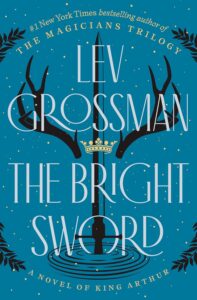
Lev Grossman, The Bright Sword
Viking, July 16
I mentioned the summer of Arthur earlier—here’s the big one, the tentpole, the book I’ve been waiting for nearly a decade: Lev Grossman’s Arthurian epic, clocking in at nearly 700 pages and absolutely worth lugging to the beach/the mountains/the park/wherever else you might be vacationing. I’m happy to report that this book is not only one of the best of the year, but it’s one of the best Arthurian novels ever. Stand it up against The Once and Future King or The Mists of Avalon and I’d be willing to bet that it will come away the victor—it’s that good.
Probably because it doesn’t bother with trying to tell the stories you’ve already heard a thousand times, but instead it picks up with a young knight on his way to Camelot to join the Round Table, only to find that nearly everybody is dead or gone and the only knights left are a rag-tag bunch from the edges of the well-known tales. Grossman uses these characters to show different angles Arthur’s court, to bring more diverse voices into the legend of the Round Table, and to craft a story that genuinely answers the question of why Arthurian legend continues to speak to us across the centuries. It’s this generation’s great Arthur story and a rich reminder of the power we have—maybe even the responsibility—to reshape legend. –DB
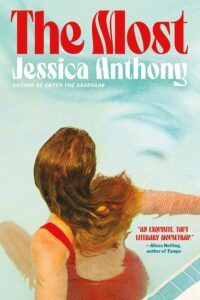
Jessica Anthony, The Most
Little, Brown, July 30
Another short novel that takes place in a single day—this may be the perfect summer form. In it, a housewife gets into the pool of her apartment complex—it’s a freakishly warm November day in 1957—and refuses to come out. The book slips between her perspective and that of her bewildered husband, neither of whom, it soon becomes clear, has been being completely (or even slightly) honest with the other. The whole thing has the extraordinarily pleasurable texture of gossip, wrapped up in the slightly eerie texture of a Cheever story. I read it straight through. –ET
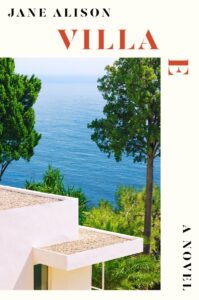
Jane Alison, Villa E
Liveright, August 6
The latest novel from Alison, author of, most recently, the excellent craft book Meander, Spiral, Explode, is itself a kind of spiral, as two aging artists (based on Irish designer Eileen Gray and Swiss architect Le Corbusier) circle around the past, and the single villa—with its spiral staircase—that has been at the center of their conflict for thirty years. But aside from the historical anecdote itself (once described as an “act of naked phallocracy”), the most interesting aspect of the book is the way Alison represents these two different consciousnesses on the page—their slipstream thoughts, both recursive and immediate, but each distinct, pinning their bodies in space. –ET
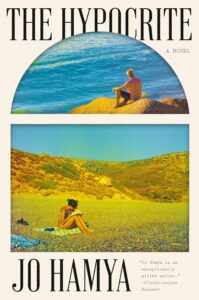
Jo Hamya, The Hypocrite
Pantheon, August 13
I was instantly pulled in by the ingenious structure of this novel: a famous novelist, lately getting flak for being Old and White and Male, sits down in a theater to watch a play written by his daughter Sophia, which he soon realizes is based on a vacation the two of them took when she was a teenager. Meanwhile, Sophia, the playwright, has dinner with her mother, who is recounting the months she cared for her ex-husband after lockdown. In between, we get pieces of the play itself and of Sophia’s actual memories of that vacation, as all the various strands braid into a fraught, compelling conversation, not just between parents and children, but between generations, and even between modes of art and understanding. –ET
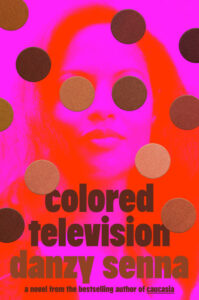
Danzy Senna, Colored Television
Riverhead, September 3
In Danzy Senna’s latest, a novelist and her family are “housesitting” in the fancy L.A. home of an old friend, Brett—who was once a writer, like Jane, but gave it all up to make television about zombies. In his well-appointed office, she finally finishes the book she’s been working on for a decade—a sprawling, enormous manuscript that her husband calls her “mulatto War and Peace“—and sends it off to her agent, only to be . . . let’s say disappointed. On a whim, Jane contacts Brett’s film agent, and winds up running ideas with a big-shot producer who wants to make “the Jackie Robinson of biracial comedies”—but soon, things begin to get weird, and then bad, and then very bad. True to form for Senna, this is a hilarious and also distinctly melancholy novel, witty and profound about class, race, and artmaking. You’ll laugh, you’ll gasp, you’ll cringe, and whisper no no no at the page, and most importantly, you’ll keep reading, even when you could be watching television. –ET

